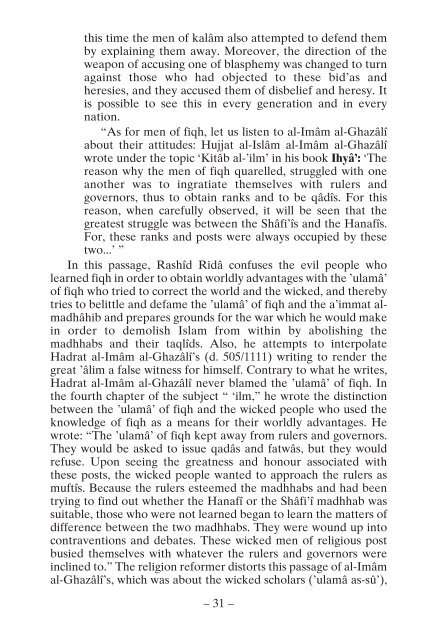Answer to an Enemy of Islam
Answer to an Enemy of Islam This is a refutation of the lies and slanders which the lâ-madhhabî Rashîd Rıdâ of Egypt, who appeared in the disguise of a religious man and wrote against the scholars of Islam in his book Muhâwarât.
Answer to an Enemy of Islam
This is a refutation of the lies and slanders which the lâ-madhhabî Rashîd Rıdâ of Egypt, who appeared in the disguise of a religious man and wrote against the scholars of Islam in his book Muhâwarât.
You also want an ePaper? Increase the reach of your titles
YUMPU automatically turns print PDFs into web optimized ePapers that Google loves.
this time the men <strong>of</strong> kalâm also attempted <strong>to</strong> defend them<br />
by explaining them away. Moreover, the direction <strong>of</strong> the<br />
weapon <strong>of</strong> accusing one <strong>of</strong> blasphemy was ch<strong>an</strong>ged <strong>to</strong> turn<br />
against those who had objected <strong>to</strong> these bid’as <strong>an</strong>d<br />
heresies, <strong>an</strong>d they accused them <strong>of</strong> disbelief <strong>an</strong>d heresy. It<br />
is possible <strong>to</strong> see this in every generation <strong>an</strong>d in every<br />
nation.<br />
“As for men <strong>of</strong> fiqh, let us listen <strong>to</strong> al-Imâm al-Ghazâlî<br />
about their attitudes: Hujjat al-Islâm al-Imâm al-Ghazâlî<br />
wrote under the <strong>to</strong>pic ‘Kitâb al-’ilm’ in his book Ihyâ’: ‘The<br />
reason why the men <strong>of</strong> fiqh quarelled, struggled with one<br />
<strong>an</strong>other was <strong>to</strong> ingratiate themselves with rulers <strong>an</strong>d<br />
governors, thus <strong>to</strong> obtain r<strong>an</strong>ks <strong>an</strong>d <strong>to</strong> be qâdîs. For this<br />
reason, when carefully observed, it will be seen that the<br />
greatest struggle was between the Shâfi’îs <strong>an</strong>d the H<strong>an</strong>afîs.<br />
For, these r<strong>an</strong>ks <strong>an</strong>d posts were always occupied by these<br />
two...’ ”<br />
In this passage, Rashîd Ridâ confuses the evil people who<br />
learned fiqh in order <strong>to</strong> obtain worldly adv<strong>an</strong>tages with the ’ulamâ’<br />
<strong>of</strong> fiqh who tried <strong>to</strong> correct the world <strong>an</strong>d the wicked, <strong>an</strong>d thereby<br />
tries <strong>to</strong> belittle <strong>an</strong>d defame the ’ulamâ’ <strong>of</strong> fiqh <strong>an</strong>d the a’immat almadhâhib<br />
<strong>an</strong>d prepares grounds for the war which he would make<br />
in order <strong>to</strong> demolish <strong>Islam</strong> from within by abolishing the<br />
madhhabs <strong>an</strong>d their taqlîds. Also, he attempts <strong>to</strong> interpolate<br />
Hadrat al-Imâm al-Ghazâlî’s (d. 505/1111) writing <strong>to</strong> render the<br />
great ’âlim a false witness for himself. Contrary <strong>to</strong> what he writes,<br />
Hadrat al-Imâm al-Ghazâlî never blamed the ’ulamâ’ <strong>of</strong> fiqh. In<br />
the fourth chapter <strong>of</strong> the subject “ ‘ilm,” he wrote the distinction<br />
between the ’ulamâ’ <strong>of</strong> fiqh <strong>an</strong>d the wicked people who used the<br />
knowledge <strong>of</strong> fiqh as a me<strong>an</strong>s for their worldly adv<strong>an</strong>tages. He<br />
wrote: “The ’ulamâ’ <strong>of</strong> fiqh kept away from rulers <strong>an</strong>d governors.<br />
They would be asked <strong>to</strong> issue qadâs <strong>an</strong>d fatwâs, but they would<br />
refuse. Upon seeing the greatness <strong>an</strong>d honour associated with<br />
these posts, the wicked people w<strong>an</strong>ted <strong>to</strong> approach the rulers as<br />
muftîs. Because the rulers esteemed the madhhabs <strong>an</strong>d had been<br />
trying <strong>to</strong> find out whether the H<strong>an</strong>afî or the Shâfi’î madhhab was<br />
suitable, those who were not learned beg<strong>an</strong> <strong>to</strong> learn the matters <strong>of</strong><br />
difference between the two madhhabs. They were wound up in<strong>to</strong><br />
contraventions <strong>an</strong>d debates. These wicked men <strong>of</strong> religious post<br />
busied themselves with whatever the rulers <strong>an</strong>d governors were<br />
inclined <strong>to</strong>.” The religion reformer dis<strong>to</strong>rts this passage <strong>of</strong> al-Imâm<br />
al-Ghazâlî’s, which was about the wicked scholars (’ulamâ as-sû’),<br />
– 31 –

















